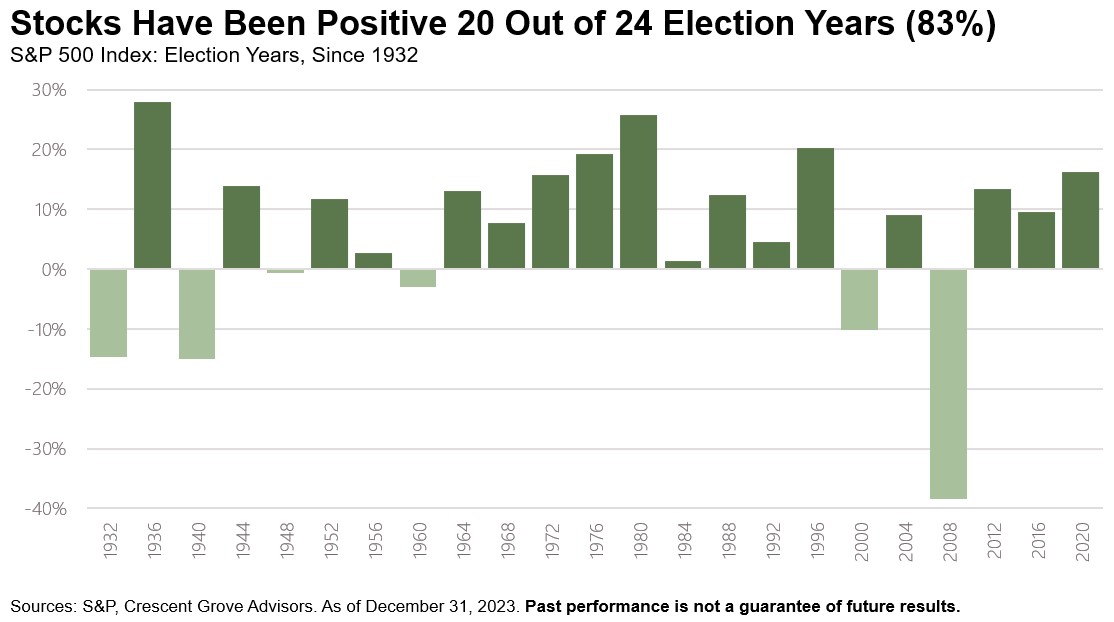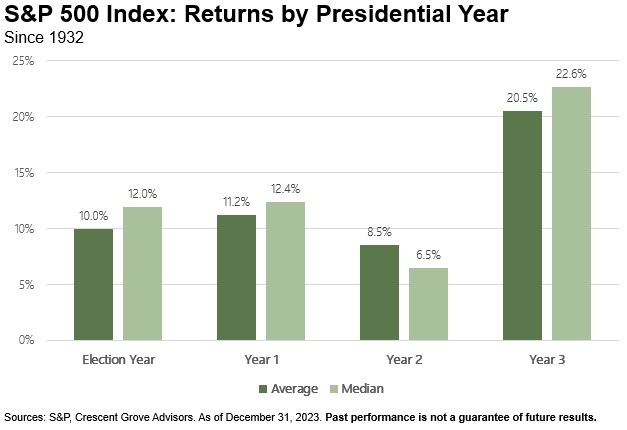
As we enter another election season, politics will inevitably occupy a prominent place in consumers’ minds. Presidential campaigns offer a wave of new policy promises and agendas that look to address kitchen-table issues like jobs, taxes and health care.
Presidential elections also feel incredibly consequential, as whoever wins control of the White House will be in charge of the policy agenda for the next four years. Consumers naturally speculate about how election outcomes and policy proposals might affect their household budgets and investment portfolios.
But the truth is that the economy and the markets are much more indifferent to presidential election outcomes than many people believe. Despite the uncertainty, history shows us that investors don’t have to worry too much about how an election result will affect their investments — and keeping this top of mind will help them navigate economic waters during 2024.
Investors have been rewarded regardless of who wins the White House
Conventional wisdom suggests one political party is inherently better or worse for investors than another, but historically, stock returns have been strong under both Democratic and Republican presidents. In looking at past returns since 1932, Democratic presidents have seen stocks advance by 8.6% on average, compared to an average of 6.6% under their Republican counterparts.
But these numbers don’t tell the full story. When removing outlier periods from the averages — the boom years under Bill Clinton and the subsequent dot-com bust and global financial crisis under George W. Bush — the difference in returns between parties is practically zero, suggesting investors interpret historical relationships with a healthy skepticism.

Furthermore, the stock market has typically performed well during presidential election years, in spite of all the uncertainty and media chatter. The S&P 500 has delivered positive annual returns in 20 out of 24 presidential election years from 1932 through 2020. During the 24 presidential election years that occurred in that 88-year period, the S&P 500 delivered an average of 10% annual returns during an election year and on average continued to produce positive returns for each of the three years following an election year.

Markets like checks and balances
Contrary to popular belief, the economy and the stock market actually do better when the White House and Congress are controlled by two different parties. According to S&P data, stocks delivered an average of 12.9% annual returns from 1932 through 2023 when Republicans were in charge of both the White House and Congress, and 9% during that time when Democrats were in power of both branches of government.
However, when there has been a Democratic president and a Republican-controlled Congress from 1932 through 2023, the S&P 500 delivered higher annual returns — of 14%. And stocks have delivered average annual returns of 13.6% when there was a Democratic president and control of the House of Representatives and Senate were split.
In other words, political gridlock can actually be good for investors, because it makes it harder to pass sweeping policy changes that could negatively affect the economy.
In addition, the U.S. economy is big and resilient and is dominated by the private sector, meaning the majority of economic activity is outside the direct control of politicians.
Economic fundamentals are what really matter
While it’s easy to attribute stock price action to one party’s politics, the reality is more nuanced, and market performance is not so easily tied to election cycles or political agendas. Political headlines may drive performance narratives in the near term, but over the long term, returns are driven much more by underlying fundamentals.
The path of monetary policy, the ebb-and-flow of the economy and the strength of corporate earnings are all much more important factors than policy decisions emanating from the White House. Ultimately, it’s the economic backdrop, not the political party in control of the White House, that’s more relevant to understanding why stocks go up or down.
Key takeaways
It's natural to be concerned about elections, but history suggests they have minimal impact on portfolios and markets. In the long run, it’s a fool’s game to try to predict how the U.S. economy and markets will respond to election cycles or political outcomes. Instead, consumers should allow their long-term goals and needs to guide their personal finances and investment portfolios.
One of the big advantages of working with a trusted financial adviser is that they can help Americans keep a cool head among all the media and social media chatter. An adviser can work with an individual or a family to create a budget for meeting expenses and saving money over the long term, and also craft a financial plan to save for college tuition and a financially secure retirement.
After these household budgets and financial plans are created, advisers can serve as behavioral coaches to keep individuals and families focused on their long-term goals and calm them down when they are considering financial decisions based on what they are feeling and hearing in the run-up to Election Day in 2024 or in future presidential election years.
Data isn’t emotional. It doesn’t listen to the TV news or monitor social media. And the data says the American economy and stock market are not drastically affected by the outcome of presidential elections — and, in fact, all that uncertainty can be much ado about nothing.






